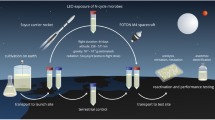Abstract
Bacterial Fuel Cells are innovative energy systems that use bacteria to transform carbohydrates anaerobically into free electrons and waste products. The bacteria deposit the electrons on the anode and hence create a potential difference between the anode and the cathode, yielding a ‘bacterial battery’. This principle may be favourably influenced by enhanced bacterial productivity or bacterial growth in microgravity conditions, as is shown before in several other studies on bacteria in microgravity. Nonetheless, bacterial fuel cells have not been tested in space before. Currently foreseen applications are very promising for space flight and include waste disposal in manned space vehicles. This study describes a ‘space-first’test of bacterial fuel cells onboard the International Space Station using the Rhodoferax ferrireducens strain. We test if it is possible to use a bacterial fuel cell in 1g and under both simulated (RPM) and real microgravity conditions. Due to differences in magnitude of the output the data had to be normalized and cumulatively plotted. In all, it can be concluded that bacterial fuel cells show similar phases in the output under different gravitational conditions. Hence it can be concluded from a biological point of view that bacterial fuel cells do operate in space.
Similar content being viewed by others
References
Chadhuri, S.K., Lovley, D.R.: Electricity generation by direct oxidation of glucose in mediatorless microbial fuel cells. Nature Biotechnology, vol. 21, nr.10, 1229–1232 (2003)
Rabaey I., Ossieur W., Verhaege M., Verstraete W.: Continuous microbial fuel cells convert carbohydrates to electricity. Water Science and Technology 52(1-2): pp515–523 (2005)
Finneran K.T., Johnsen C.V., Lovley D.R.:Rhodoferax ferrireducens sp. nov., a psychrotolerant, facultatively anaerobic bacterium that oxidizes acetate with the reduction of Fe(III). International Journal of Systematic and Evolutionary Microbiology. May;53(Pt 3):669–73 (2003)
Lovly, D.R.: Microbial fuel cells: novel microbial physiologies and engineering approaches. Current Opinion in Biotechnology. 17(3): pp. 327
Author information
Authors and Affiliations
Corresponding authors
Rights and permissions
About this article
Cite this article
de Vet, S.J., Rutgers, R. From waste to energy: First experimental bacterial fuel cells onboard the international space station. Microgravity Sci. Technol 19, 225–229 (2007). https://doi.org/10.1007/BF02919487
Issue Date:
DOI: https://doi.org/10.1007/BF02919487




